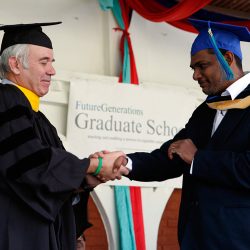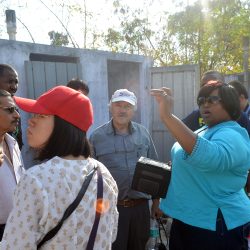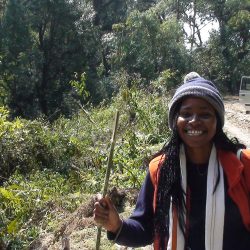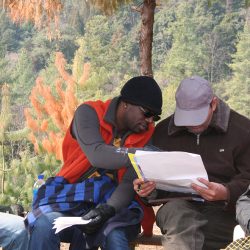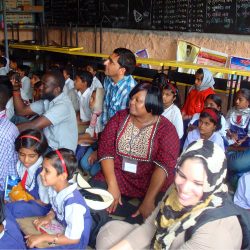Future Generations University Alumni
 KAYANA AMOS
KAYANA AMOS
Kayana is a social worker focused on sustaining natural resources in economically depressed communities– primarily Linden, Guyana.
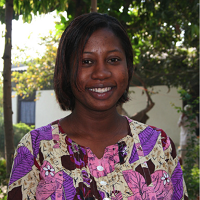 GOLDIE SCOTT
GOLDIE SCOTT
Goldie works to address the development needs of children and families She is dedicated to empowering youth, addressing urban poverty, and encouraging micro-businesses.
 BESS-BASCOM DONELL, CLASS OF 2015
BESS-BASCOM DONELL, CLASS OF 2015
Practicum Summary: Housing and Women’s Empowerment: A case study of the Hinterland Housing Pilot Project in Guyana
Donell’s study examines the role of Amerindian women in the Hinterland housing pilot project in Guyana. The primary objective of this project was to address the housing needs of 9 communities in regions 1 and 9 of Guyana by disbursing subsidies for the construction of complete houses or new zinc roofs and rain water harvesting systems. Donell’s research analyzes whether the housing project had any impact on gender equality and women’s empowerment, and seeks to influence the National Housing Policy regarding interventions for marginalized groups. The study found that now that the basic needs of adequate shelter and water resources had been met, women who participated in the pilot expressed aspirations and had even taken action to pursue other needs in their lives. At the household level, women desire further improvements in housing conditions and increased income generations. At the community level, women would like to see infrastructural development, increased educational and economic opportunities, and a more important role in community leadership. Overall, the active participation of women in the housing project was integral to the project’s success, which initiated a shift in women’s perceptions of their own capabilities and control over resources and their own lives. For the future Donell recommends the creation of gender sensitive program development to encourage female participation in projects, with a institutional means to measure progress.
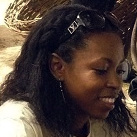 FRANCE SHONDELL, CLASS OF 2013
FRANCE SHONDELL, CLASS OF 2013
Practicum Summary: Root Causes of Youth Violence in Sophia, Guyana
Shondell’s research seeks to identify the impacts of youth violence in Guyana and the communities that are perceived as hot spots for violent activity in order to develop interventions to redirect youth energy towards positive community development. Shondell focused her study on the community of Sophia, specifically the Pattensen and Turkeyen areas located east of Sophia. Out of the 35,000 residents of Sophia, roughly 16,000 of them are youth. For the purpose of this study, Shondell refers to the WHO definition of youth violence, which defines it as “the intentional use of physical force or power, threatened or actual, exerted by or against children, adolescents or youth adults, ages 13-29, which results in or has a high likelihood of resulting in injury, death, psychological harm, mal development, or deprivation.” Common problems in the community that contribute to youth violence include youth idleness, unemployment, a high school dropout rate, teen pregnancy, and theft, accompanied by illiteracy and high incidences of poverty. Shondell used focus group discussions, key informant interviews, youth surveys, and documents to create an evaluation of the youth violence condition in Sophia. From her data collection, it was determined that having family or friends involved in violence, police labeling, and poverty were the three main contributors to violence in Sophia. Other factors attributed to violence include boredom, family problems, lack of activities, school problems, gangs, and a need for respect. In order to protect youth from violence, Shondell mentions the incorporation of conflict resolution and critical thinking skills into education, as well as promoting interventions in schools, community groups, clubs, faith-based organizations, and other peer groups that could persuade youth away from violence activity.
 EVERSLEY SHELLON, CLASS OF 2011
EVERSLEY SHELLON, CLASS OF 2011
Practicum Summary: HIV/AIDS and Dependency in Guyana
Shellon’s study was undertaken by Agape Network Inc., a faith-based NGO located in the community of Sophia, Guyana. Agape focuses on reducing the prevalence of HIV/AIDS and offers hope to People Living with HIV/AIDS through program activities that benefit Orphan and Vulnerable children, youth, and adults, such as leadership skills training and capacity building initiatives. The overall objectives of the study include determining the degree of dependence of People Living with HIV/AIDS (PLWHA) on Agape Inc.’s programs, and generating useful data that will serve as a new foundation for designing new program interventions that work toward the goal of having PLWHA become self-reliant. Using interviewing techniques, Shellon concluded that even though people have benefited from capacity building and skills trainings, they continue to be dependent on Agape Inc. programs. She recommends a continuation of the skill training program and providing financial assets and other capital to start up a business after completing the training.
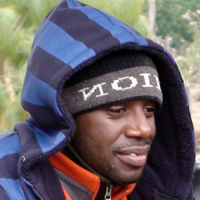 EVERSLEY TRAVIS
, CLASS OF 2011
EVERSLEY TRAVIS
, CLASS OF 2011Practicum Summary: Youth Empowerment: Assessing and Addressing the Lack of Agency and Empowerment experienced by youth participants of Buxton/Friendship North
Travis’s research focuses on developing capacity and increasing youth empowerment and agency in the community and to encourage local capacity building in the community of Buxton Friendship in Guyana. In 2002, Buxton Friendship experienced an infamous jailbreak which catapulted the country into an unprecedented crime wave. The community became policed by criminals, and those communicating information with outsiders were executed. These events completely dismantled and disempowered the community. In his research, Travis explores youth empowerment and local development by implementing a pilot program with 15 to 25 youth in the community, which he hopes to expand to neighboring communities and eventually, country-wide.
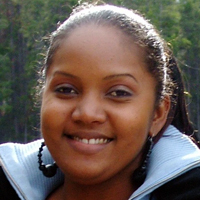 MUNRO SUZANNE, CLASS OF 2011
MUNRO SUZANNE, CLASS OF 2011
Practicum Summary: SEED-SCALE approach for improving community livelihood and conservation: The case study of Masakenari Village
Suzanne’s research addresses the impact of money on the values of the Waiwais people in the last decade after receiving external grants provided from Conservation International in 2006 to manage their lands as a Community Owned Conservation Area. Prior to declaring their lands as a Conservation Area, the Waiwais people depended on a traditional subsistence economy of trading and bartering. However, after receiving funding from external agencies, the community transitioned to a cash based economy. In her research, Suzanne assesses the impact a cash based economy has had on the culture of the Waiwais, including a high level of dependency on external funding. Furthermore, she discusses the SEED-SCALE approach and how it could contribute to positive reformation of the community livelihood and conservation initiative in Masakenari village.
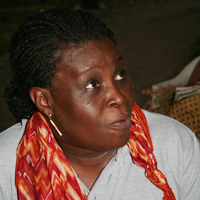 ROBERTSON JACKIE, CLASS OF 2011
Practicum Summary: From Crisis to Empowerment Opportunity For the Community of Mahdia, Guyana, SA
ROBERTSON JACKIE, CLASS OF 2011
Practicum Summary: From Crisis to Empowerment Opportunity For the Community of Mahdia, Guyana, SA
Jacquelene’s study was designed to discover whether the three-way partnership approach could serve as a mechanism for empowering residents in the community of Mahdia, Guyana, and accelerate the community development process. The three entities involved in the partnership are the following: 1) the central government, who will supervise and provide funding for projects, 2) nongovernmental organizations who will assist with training and empowerment programs, and 3) the local community, who will participate and support the programs, thus instigating a bottom-up development technique. The main goal of the project was to introduce the SEED-SCALE strategy to assist in organizing a citizen-organized approach to development where a traditional government structure is absent. Using a case study approach in which groups were observed, monitored, events documented, sessions videotaped, and public documents analyzed, Jacquelene determined that a three way partnership filled the gap of a traditional strategic partnership, and contributed to achievements among the grass root-level where all sectors are involved in the advancement and empowerment strategy.
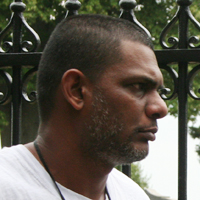 SAGAR ROHAN, CLASS OF 2011
SAGAR ROHAN, CLASS OF 2011
Practicum Summary: Ethnic Conversations in Sonic Spaces
Rohan’s study examines the historical settlement, cultural identities and values, the phenomenon of music, and the role of music in the preservation and sustenance of ethnic and cultural identities in Guyana. The research focuses on three distinct but interrelated subjects: the historical settlement in Guyana, traditional and contemporary musical genres of Guyana, and the development of an integrated music curriculum. He provides an overview of historical colonization and the exploitation of human and economic capital by Europe which led the way for ethnic and communal interdependence. Rohan’s research reconstructs the social environment that enabled specific compositions and music performances to foster inter-ethnic peace, harmony, and communal transformation. His study concludes by advocating an expanded music curriculum that interrogates the legitimacy of Guyana’s six ethnic and cultural identities, and advances the historical social and cultural context that created Guyana’s education system. Rohan concludes his study with a newly developed music curriculum for Guyana that will restore, revitalize, and sustain ethnic and cultural values while building a tolerant, bonded society.

